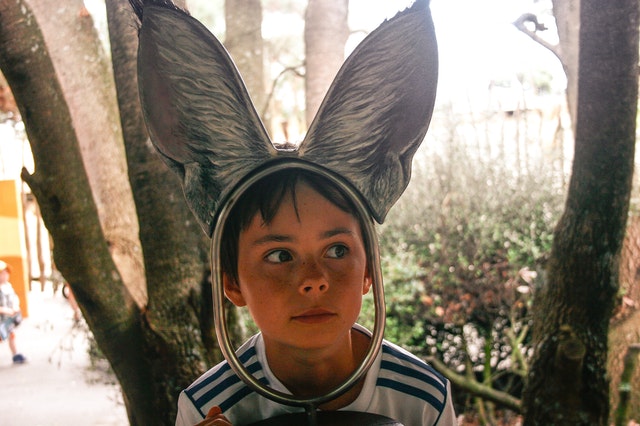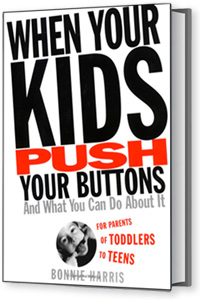Becoming a parent is easy. Being a parent is the hardest job you will ever have. There are as many “shoulds” and “oughts” about parenting as books on bookstore shelves. What should you do? Who do you listen to?

Some say trust your instincts. I agree. After all we are evolved to procreate and raise children in the culture of our heritage. It should be as easy as it appears for the birds and the bees. But where are all those wise instincts we’re born with? For most of us, they are buried under layers upon layers and years and years of being told what to do, when to do it and how to do it. We’re taught if we don’t listen to parents and elders, we will be in trouble, maybe not be loved or accepted. Years of learned experience has set up detours and roadblocks tricking most of us away from our instincts to look in the wrong direction for the answers.
The answer is found in trusting yourself.
But first you have to believe that you actually do know what to do? Probably you learned you shouldn’t trust yourself because you were taught to listen to your parents and teachers no matter what. Giving your opinion was thought of as rude and “talking back”. You probably decided to just keep quiet and stay out of the way so nobody yelled at you. Or you decided you didn’t need anybody and began listening to the wrong people. You learned so much in all those developing years – just not how to trust yourself.

All the information and know-how is right in front of your nose. You can learn to parent from your children. Not from your parents, not from society. Your children are the only ones who can teach you what they need. Who knows your child better than your child? All you need is to trust yourself to listen and learn and then take your cues from your kids. You may first need to learn that your children are actually telling you what they need and aren’t being bad. The key is in creating the relationship and trust that allows you privy to those cues, interpret them and understand your child.
First you have to silence all those loud voices telling you what to do, what not to do and why you should never listen to yourself or your child.
What you need in order to learn from your child is:
- The courage to allow your child to lead the way. This in no way limits your role and authority as parent.
- An understanding of your child’s temperament and developmental stages. You need to know what to realistically expect so limits are appropriate.
- The ability to translate your child’s behavior in order to understand her needs so as not to take her behavior personally and at face value.
- The skills of establishing a mutually respectful and trusting relationship which requires your own self-respect and self-trust (this is the tricky part).
The most complaints from parents: My child won’t do what I say. The most complaints from kids: My parents won’t listen.

Finding Your Way
The writer, John McFee, says of editors whom he believes not to be editors but “rewriters”, “These are people who superimpose their own patterns on the work of writers and seem to think it is their role to force things in the direction they would have gone in if they had been doing the writing.” Now replace rewriter with parent and writer with child: There are [parents] who “superimpose their own patterns on the work of [children] and seem to think it is their role to force things in the direction they would have gone in…”
The discrepancy in age and life experience gives you the idea that you know better and must teach your children the “right” way to do things. It’s hard to step back, accept the snail’s paced developmental process and understand that children cannot learn at your pace. And your child’s pace may be quite different from the neighbor’s child’s pace who appears ready for Harvard before your child can even get to school on time.
Accepting What We Cannot Control
Somewhere in the back corner of your consciousness you know that you cannot control your child – or any other person for that matter. So why get so upset when that happens, when your child does something that you cannot stop? Because you keep trying to control and failing again and again, unless you have a mild mannered, malleable child. The upset, rage, and helplessness you feel is not caused by your child but from your idea that you should be able to control and make your child do what you say. Once you get it that control is an illusion, the freedom that sets in brings with it a fresh approach.
You take for granted the behaviors that don’t bother you or that actually give you pleasure and instead attend with laser focus on the behaviors you find difficult. Why not instead take the difficulties for granted and focus more on the pleasures?
Parenting is not easy. In my mind, rocket science doesn’t come close. There are difficulties, set-backs, disappointments, losses, pain, and sacrifice. These are to be expected. Understanding your child is work. But you knew this would be the case, didn’t you? Or did the picture of the perfect family move into your headspace and blind you to the reality of a messy life with children?

That desire for the idyllic family you always wanted kickstarts the comparisons — your life and your children to all the other silk-screened, sepia-toned, air-brushed families you see out there. Those parents are always calm. No child is as unruly, defiant, and stubborn as yours. So what’s wrong with you? It’s got to be your fault. Well, guess what? Nobody has the perfect family, and striving for perfection creates a boulder-sized obstacle in your path to connect with your kids.
There is an old saying. “If you find yourself in a hole, first, stop digging.” Complaining, comparing, blaming, and trying to control, digs your hole deeper with every shout, threat, and coercive tactic you think will “work”. Sometimes it does “work” in the moment and you get a moment of piece. But that moment is like a feel-good drug requiring the next fix. And so the cycle of misunderstood behavior and the punishment fix sets in.
It Takes Courage to Allow and Let Go
Understanding behavior means really listening, being in the moment instead of fearing the future. Children do not know how to express themselves in an adult way; they do so with their behavior. Often that behavior is dramatic and loud when they fear they are not being heard.

Your child wants to please you more than anything in life. If he’s behaving in a way he knows is upsetting to you, he’s trying to tell you something. Do you have the courage to listen, to stop reacting and catastrophizing, to back up and say, “I hear you. I get you. Let’s work this out.”
Mutually respectful relationships happen when neither party is out to win but both are willing to listen, hear each other’s opinions and wishes, and find a resolution that works for both. That’s called problem solving. The skill that can save our world when enough people know how to do it.
 We punish our children in an attempt to keep them from pushing our buttons, often escalating the original problem into a cycle of anger and blame. When Your Kids Push Your Buttons is not about what to do to your kids to get them to stop pushing your buttons. This book is about how to be the parent you wish you could be-the parent that only you are holding yourself back from.
We punish our children in an attempt to keep them from pushing our buttons, often escalating the original problem into a cycle of anger and blame. When Your Kids Push Your Buttons is not about what to do to your kids to get them to stop pushing your buttons. This book is about how to be the parent you wish you could be-the parent that only you are holding yourself back from.







